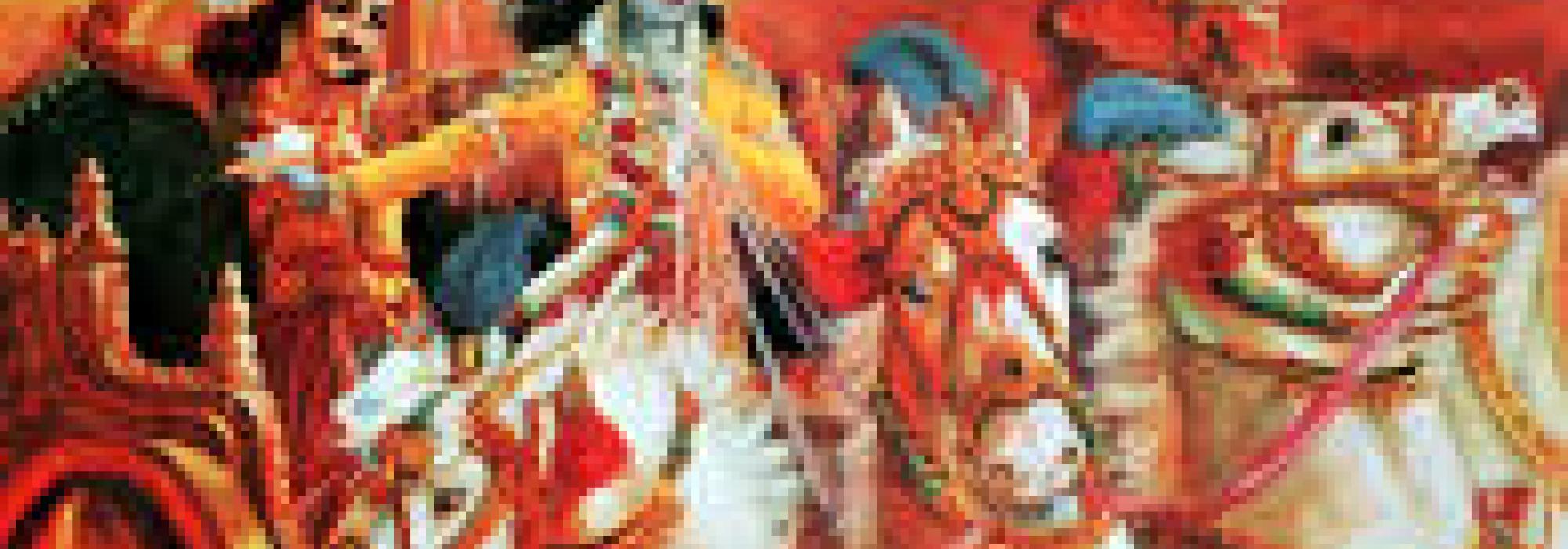Here, by “divine eyes” we do not need to imagine a pair of extra-physical eyes with their own eyeballs and eyelids. It is enough to think that Bhagavān endowed the eye with the ability to behold divine effulgence. This is what we have to understand - when we pray to Īśvara for a boon, we need to ask for the requisite strength to bear and control the blessing. Our desires know no limits and make us forget what is suitable and what is not. If Bhagavān gives us what we deserve, we’re dissatisfied. However, if he grants us whatever we ask of him, it is akin to committing suicide. Gastric issues are guaranteed if one forgets one’s digestive ability and indulges in a feast. When we pray for a meal, we need to ask for medicine for indigestion as well. When taking up a vow in a deity’s honour for progeny, one must not forget to ask for means of sustenance. When asking for a kingdom, we must not forget to ask for a treasury and an army too. When asking for a boon, we need to also ask for the ability to use the blessing well.
Śrī Kṛṣna had a lot of love for Arjuna. Therefore he first gave him the faculty for divine vision and only then showed him his divine form. Sañjaya describes that magnificent form thus:
divi sūryasahasrasya bhaved-yugapad-utthitā।
yadi bhāḥ sādṛśī sā syāt bhāsas-tasya mahātmanaḥ ॥
tatraikasthaṃ jagatkṛtsnaṃ pravibhaktamanekadhā ।
apaśyaddevadevasya śarīre pāṇḍavastadā ॥
"From that Mighty Being arose a great effulgence - the effulgence of a thousand suns rising at the same time in the sky. Arjuna then saw the entire world as one and split as many in the body of the deva of devas."
He was flabbergasted; he trembled; his hairs stood on end; he folded his hands and began praising Bhagavān.
paśyāmi devānstava deva dehe
sarvānstathā bhūta-viśeṣa-saṅghān ॥BG 11.15
tvam avyayaḥ śāśvata-dharma-goptā
sanātanas tvaṃ puruṣo mato me ॥BG 11.18
"O, Primordial Being! I see groups of all animals and organisms in your body. You are deathless and the protector of eternal dharma. You are the most ancient and the Supreme being."
dyāvā-pṛithivyor-idam antaraṃ hi
vyāptaṃ tvayaikena diśaś-ca sarvāḥ ||
dṛiṣṭvādbhutaṃ rūpam ugraṃ tavedaṃ
loka-trayaṃ pravyathitaṃ mahātman ||BG 11.20
“The sky above, the earth below and everything in between has been pervaded by you alone! You pervade every direction. O Great Being! All the three worlds tremble on seeing this wondrous and terrifying form of yours.”
rūpaṃ mahat te bahu-vaktra-netraṃ
mahā-bāho bahu-bāhūru-pādam
bahūdaraṃ bahu-daṃṣṭrā-karālaṃ
dṛṣṭvā lokāḥ pravyathitās-tathāham ||BG 11.23
“Your form is immense; the faces are innumerable; the eyes so many; countless arms; countless legs, umpteen stomachs; myriad terrifying teeth; the worlds are distressed with fear upon seeing this form. So am I.”
amī ca tvāṃ dhṛtarāṣṭrasya putrāḥ
sarve sahaivāvani-pāla-saṅghaiḥ |
bhīṣmo droṇaḥ sūta-putras-tathāsau
sahāsmadīyair-api yodha-mukhyaiḥ ||BG 11.26
“All these sons of Dhṛtarāṣṭra, and these royal retinues with them, Bhīṣma, Droṇa, and all the braves on the Pāṇḍavas side as well - what is happening to all of us?”
lelihyase grasamānaḥ samantāl-
lokān samagrān vadanair jvaladbhiḥ
tejobhir āpūrya jagat samagraṃ
bhāsas tavogrāḥ pratapanti viṣṇo ||BG 11.30
“O Great all-pervading one, Viṣṇu! We are being licked on all sides by your tongues as if we are dainty dishes. With the entire world being pervaded by your fiery faces, your ferocious flames appear as if they will burn the entire universe”
ākhyāhi me ko bhavān ugra-rūpo
namo’stu te deva-vara prasīda |
vijñātum ichchhāmi bhavantam ādyaṃ
na hi prajānāmi tava pravṛttim ||BG 11.31
“O Ferocious one! Who are you? Tell me, O best among gods! I bow to you, be appeased! I know not your nature. I would like to understand you - who existed before everything.”
Did you understand the impact of direct experience? What a difference in effect between jñāna (intellectual understanding) gleaned by the intellect and vijñāna (experiential wisdom) seen by the eyes and felt by the manas! When he asked for the vision of the cosmic form, Arjuna never even for a bit thought that the experience would be this terrorising! He thought that witnessing the vision with his eyes would be as easy as arguing with his words. What happened during the vision, though? Fear, trembling, distress! This shows that Arjuna’s understanding of the truth was not complete. He had only seen the pleasant side of Bhagavān but not the terrible aspect. Suppose a person knows only one face of a two-faced thing, how can we say that he has complete knowledge of it? The seeker of truth must know as many facets of the truth as there are. It is not enough to just have heard of something. One should have seen the thing with one’s own eyes. It is not just enough to have seen and heard the thing, but the thing must be grasped by the buddhi as well. And not just intellectually grasped by the buddhi, but should have been experienced by the manas and the seeker should become one with the sought. Becoming one with the sought — becoming it — is complete experience. Similar was Arjuna’s state now after experiencing the vision of the Universal form. When the śruti says - “cakṣurvai satyam” (the eye is the truth), it does not mean that whatever is seen by the eye is the truth but that the eye is one of the instruments for reaching the truth. Even theoretical knowledge strengthened by intellectual inference and logical strengthening is insufficient. The truth is experienced only when the theory is confirmed by visual validation. Arjuna needed such a direct confirmation and he got it now.
Even though Bhagavān had bestowed divine vision upon Arjuna, the latter’s human frailty had remained. The strength of his manas had not increased. Hence the fear. Even after what he sought after appeared in front of him, he experienced fear. Those who think that Brahma-experience is nice and pleasant must repeatedly recollect this episode. Brahma is not a grocery item to be bought from a store. If we make Brahma-experience cheap, it is us who suffer, not Brahma. Hence it is better to limit idle talking and casual listening about Brahma and mokṣa.
When the scared Arjuna asked
“ākhyāhi me ko bhavān ugra-rūpo
Bhagavān took pity on him and answered him.
kālo’smi loka-kṣaya-kṛt pravṛddho
lokān samāhartum iha pravṛttaḥ |
ṛte’pi tvāṃ na bhaviṣyanti sarve
ye’vasthitāḥ pratyanīkeṣu yodhāḥ ||BG 11.32
“I am Time who destroys worlds as well as nourishes them. I am now set upon destroying the world. Even without you, none of the enemy warriors will survive”.
tasmāt tvam uttiṣṭha yaśo labhasva
jitvā śatrūn bhuṅkṣva rājyaṃ samṛddham
mayaivaite nihatāḥ pūrvam eva
nimitta-mātraṃ bhava savya-sācin ||BG 11.33
“Therefore, arise and partake of victory by participating in the war. Enjoy the bountiful kingdom by defeating your rivals who have already been killed by me. Be only the instrument, Arjuna!”
mayā hatāṃs tvaṃ jahi mā vyathiṣṭhā
yudhyasva jetāsi raṇe sapatnān ||BG 11.34
“Your enemies have already been killed by me. The work of defeating them is truly complete. Do not think about them. Do not grieve for them. Come to battle!”
Did Arjuna not already accept that Īśvara is the “sarva-dharma-goptā” (the eternal protector of dharma) in the eighteenth verse? The responsibility of protecting dharma is that of Īśvara, not of Arjuna and not of Bhīṣma or the others. Whatever was needed to establish dharma had already been planned and set in motion. That plan would not have stopped even if Arjuna had demurred. Such is divine rule. The same is referred to by Bhagavān later as “daivaṃ caivātra pancamam” (18-14) (Divine providence is the fifth factor that determines the outcome of any action). Be it in an individual’s life or the history of civilisations - divine providence is the final arbiter. Not acknowledging the divine is being egoistic. Arjuna understood this.
A war had become inevitable for the survival of the world. Without it, essential and eternal dharma would not have held out amidst mortals. This was not a war just for one Arjuna or five Pāṇḍavas. Arjuna’s role in it was not as a cause, but as an instrument. Any conflict needs two sides. One side was ready and the other was wavering. It was necessary for the protector of eternal dharma to firm up the fickle side.
The secret of the universe that had eluded Arjuna in the lectures on sāṅkhya, karma and jñāna became evident to him now. Bhagavān is the controller of the world. He has assigned us a dhārmic duty only to benefit us. If we do not perform that duty, it is not dharma that will be affected but our own progress. Bhagavān can use others if we disregard our duty. But we are the ones who will be left without a resort. When such a beneficial opportunity arises, it becomes a dhārmic obligation for us. Arjuna finally understood this and expressed remorse for having protracted this investigation thus far.
yaccāvahāsārtham asat-kṛito ’si
Vihāra-śayyāsana-bhojaneṣu |
eko’tha vāpyachyuta tat-samakṣaṃ
tat kṣāmaye tvām aham aprameyam ||BG 11.42
“O Kṛṣna! Your greatness is wondrous! I have frivolously exceeded propriety while travelling, sleeping or sitting or eating, whether alone or amidst people. I implore you to forgive my transgressions.”
adṛṣṭa-pūrvaṃ hṛṣito’smi dṛṣṭvā
bhayena cha pravyathitaṃ mano me |
tad eva me darśaya deva rūpaṃ
kirīṭinaṃ gadinaṃ chakra-hastam ||BG 11.45
“I am astonished by the vision that has hitherto been unseen. But my mind quakes due to fear. Please show me your earlier form with the crown, the mace and the cakra in your hand.”
To be continued...
The present series is a modern English translation of DVG’s Kendra Sahitya Akademi Award-winning work, Bhagavad-gītā-tātparya or Jīvana-dharma-yoga. The translators wish to express their thanks to Śatāvadhāni R Ganesh for his valuable feedback and to Hari Ravikumar for his astute edits.

















































